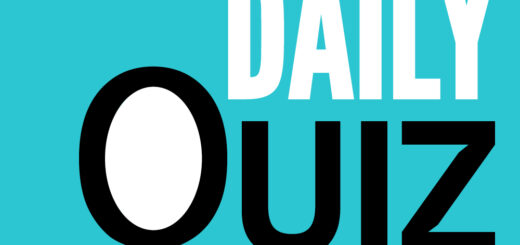Daily Current Affair Quiz: 13th May 2020
1. Which of the following statements are true?
1. The Green Climate Fund (GCF) was adopted as a financial mechanism of the UN Framework Convention on Climate Change (UNFCCC) at the end of 2015 Paris Climate Conference.
2. NABARD has been accredited by Green Climate Fund (GCF) Board as one of the National Implementing Entity (NIE) for GCF in India.
(a) 1 only
(b) 2 only
(c) Both 1 and 2
(d) Neither 1 nor 2
Ans: b
Justification:
- The Green Climate Fund (GCF) was adopted as a financial mechanism of the UN Framework Convention on Climate Change (UNFCCC) at the end of 2011 in CoP 16.
- The GCF is intended to support projects, programmes, policies and other activities in developing country for combating climate change.
- Further NABARD has been accredited by Green Climate Fund (GCF) Board as one of the National Implementing Entity (NIE) for GCF in India.
- NABARD will be responsible for management and oversight of project implementation, which includes the origination and preparation of a funding proposal, the subsequent management of the necessary stages of the implementation process until its conclusion (project management) on behalf of GCF, and reporting obligations.
2. Terminologies Net capture and Harpoon Capture can be associated with
(a) Nationally Determined Contributions
(b) Space Debris Removal
(c) Hydro Carbon Mining
(d) Green Credit System
Ans: b
Justification:
- Remove DEBRIS mission is a satellite research project intending to demonstrate various space debris removal technologies. The mission is led by the Surrey Space Centre from the University of Surrey.
- Some technologies are:
- Net capture: It involves a net that will be deployed at the target CubeSat. o Harpoon Capture: Which will be launched at a target plate made of “representative satellite panel materials”
- Vision-based navigation: Using cameras and LiDAR (light detection and ranging), the platform will send data about the debris back to the ground for processing.
- De-orbiting process: As it enters Earth’s atmosphere, the spacecraft will burn up, leaving no debris behind.
3. Which of the following statement/s is/are true?
1. VoWiFi is a Wi-Fi-based Voice over Internet Protocol (VoIP) service, which allows users to make high definition (HD) voice calls using Wi-Fi even in places with poor or no cellular network.
2. Calls made over VoWiFi have long call connection time and inferior call quality compared to calls made over VoLTE or any existing cellular technology.
(a) 1 only
(b) 2 only
(c) Both 1 and 2
(d) Neither 1 nor 2
Ans: a
Justification:
- VoWiFi is a Wi-Fi-based Voice over Internet Protocol (VoIP) service, which allows users to make high definition (HD) voice calls using Wi-Fi even in places with poor or no cellular network.
- Calls made over VoWiFi provides users with a shorter call connection time along with superior call quality compared to calls made over VoLTE or any existing cellular technology.
- Users don’t have to pay extra for these calls as it is using a Wi-Fi network. VoWiFi service does not need any separate app or a new number or any log-in to work
4. Which of the following statement/s is/are true?
1. Multi-Global Navigation Satellite System (GNSS) is the system able to calculate position, velocity and time by receiving the satellite signals broadcasted from multiple navigation satellite systems.
2. It helps to achieve high position accuracy with increased number of satellites compared to GPSonly positioning.
(a) 1 only
(b) 2 only
(c) Both 1 and 2
(d) Neither 1 nor 2
Ans: c
Justification:
- The US congress has agreed to designate India’s NavIC as its allied navigational satellite system along with Galileo of European Union and QZSS of Japan.
- The designation of India’s NAVIC as an “allied system” is part of the American effort to develop a prototype program for Multi-Global Navigation Satellite System (GNSS) receiver development.
- A Multi-GNSS receiver is the system able to calculate position, velocity and time by receiving the satellite signals broadcasted from multiple navigation satellite systems. o It helps to achieve high position accuracy with increased number of satellites compared to GPSonly positioning.
5. Which of the following Countries have shorelines along Persian Gulf?
1. Qatar
2. Kuwait
3. Bahrain
(a) 1 and 2 only
(b) 1 and 3 only
(c) 2 and 3 only
(d) 1, 2 and 3
Ans: d
Justification:
- Eight nations have coasts along the Persian Gulf: Bahrain, Iran, Iraq, Kuwait, Oman, Qatar, Saudi Arabia, and the United Arab Emirates.












